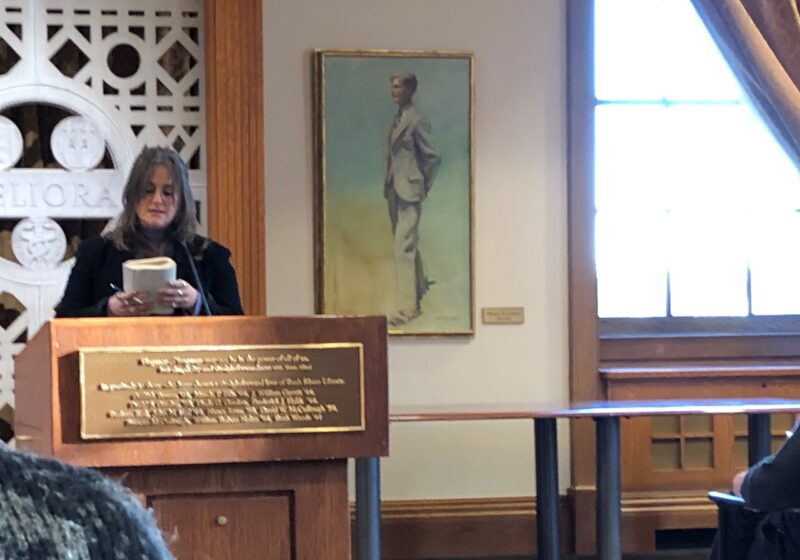On Wednesday, March 15, I walked into the Hawkins-Carlson room of Rush Rhees to attend the 2022 Kafka Prize reading. Crisp spring sunlight was flooding through the opened windows, and there was excited chatter humming throughout the room. It was a diverse crowd of UR students, professors in the English and creative writing departments, and members of the public. There were three tables set up in the back: One with some scrumptious snacks like fresh fruit and deviled eggs, another filled to the edge with canisters of piping hot coffee and tea, and one table with copies of Rebecca Sacks’ novel for sale.
After some sonic shenanigans with the microphone, the room quieted down to hear the introduction to the reading from Beth Jörgensen and Chad Post, both of whom were members of the committee that selected the winner of the 2022 Kafka Prize. Dr. Jörgensen explained that the prize was created in 1976 by friends and family of Janet Hiedinger Kafka, a young publisher and UR alum who died tragically in a car accident. The prize is awarded annually to an American woman who is a promising writer but preferably lesser-known, as Ms. Kafka was passionate about advancing the role of women in literature. Mr. Post then told us a little bit about the author who won the award in 2022. Rebecca Sacks, who also goes by Bea and uses she/they pronouns, attended Dartmouth University for undergrad, then went on to study in the UC Irvine writing program and in Tel Aviv for an M.A. in Jewish studies. After much anticipation, the microphone was handed over to Bea, the winner of the 2022 Kafka Prize for their first novel, “A City of A Thousand Gates” (HarperCollins, 2021).
From their black Doc Marten boots and the rings on every finger, I thought that Bea was going to be cool and hip, and I was totally right! They had a relaxed, humble attitude coupled with a great sense of humor (and a sprinkle of self-deprecation) as they read up at the podium. “A City of A Thousand Gates” is a novel written from the different perspectives of people living in Jerusalem and Palestine, and each chapter is through the lens of a different character. Bea explained that they chose to begin their reading from a chapter called “The Green Room,” which follows a young woman working in a surveillance room that watches over a part of the wall that separates Jerusalem from Palestine, and then read from another chapter about two Arab boys living in Palestine, one of whom has just arrived home from time in Norway, and is struggling to adjust back to his life at home. Then, Bea chose to return to “The Green Room” to finish off their reading, as that would show the audience the way that the lives of the characters intertwine, because we discover toward the end of the chapter that the woman in the Green Room is actually watching the two Arab boys and pondering if they’re a security threat.
As they read, Bea interjected little notes about their process while writing this book. They explained that they were very interested in exploring the interactions between language and identity, as they lived in Jerusalem at one point in their life, and had to learn all the invisible social rules around code-switching between Hebrew and English. They also told us their secret of how to keep track of the storyline of every character and the plot: index cards and twine. They put major plot points on index cards and clothespins them to lengths of twine pinned to the wall, moving them around as they go to ensure that everything is making sense.
After Bea finished, there was a brief Q&A. One audience member questioned why there were so many sex scenes in the novel. At the beginning of their nuanced answer, Bea explained that they did not come out as lesbian and nonbinary until after they finished writing this novel. They cited that as a reason that the book is so full of queer longing. They also explained that sex is an interesting device to explore communication between characters, and also the power imbalances between them. They also noted that American people seem particularly preoccupied with all the sex in the book, but never seem disturbed by the violence in it. Bea also brought up the fact that they are white and Ashkenazi, and some of the characters in this book are Arab Palestinians. They thought that this would be brought up in reviews and discussions of the book, but it actually hasn’t. Out of all the newspapers that reviewed “A City of A Thousand Gates,” not one brought in a Palestinian writer to do the review. Bea clarified that they’re very interested in discussing this particular issue more.
The reading illustrated all of the reasons why Bea deserved UR’s Kafka Prize. I am sure that Ms. Kafka would be very proud of them and the wonderful novel they’ve written. Be sure to keep your eyes peeled for Bea’s next novel “The Lover,” which will be released in August.



